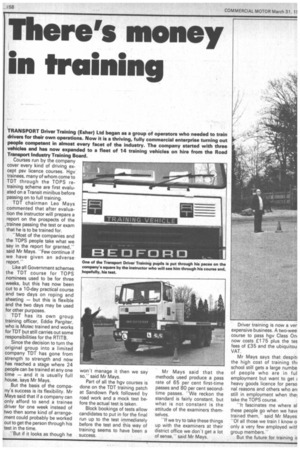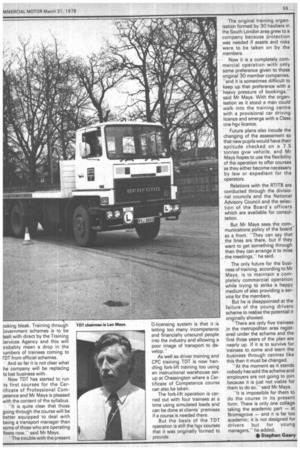There's money in training
Page 50

Page 51

If you've noticed an error in this article please click here to report it so we can fix it.
TRANSPORT Driver Training (Esher) Ltd began as a group of operators who needed to train drivers for their own operations. Now it is a thriving, fully commercial enterprise turning out people competent in almost every facet of the industry. The company started with three vehicles and has now expanded to a fleet of 14 training vehicles on hire from the Road Transport Industry Training Board.
Courses run by the company cover every kind of driving except psv licence courses. Hgv. trainees, many of whom come to TDT through the TOPS retraining scheme are first evaluated on a Transit minibus before passing on to full training.
. TDT chairman Leo Mays commented that after evaluation the instructor will prepare a report on the prospects of the ,trainee passing the test or exam that he is to be trained for.
"Most of the companies and the TOPS people take what we say in the report for granted," said Mr Mays. "Few continue if we have given an adverse report."
Like a!I Government schemes the TDT course for TOPS nominees used to be for three weeks, but this has now been cut to a 10-day practical course and two days on roping and sheeting — but this is flexible and the two days may be used for other purposes.
TDT has its own group training officer, Eddie Pargiter, who is Motec trained and works for TDT but still carries out some responsibilities for the RTIT B.
Since the decision to turn the original group into a limited company TDT has gone from strength to strength and now has reached a stage where 24 people can be trained at any one time — and it is usually full house, Says Mr Mays.
But the basis of the company's success is its flexibility. Mr Mays said that if a company can only afford to send a trainee driver for one week instead of two then some kind of arrangement could probably be worked out to get the person through his test in the time.
"But if it looks as though he
won't manage it then we say so,said Mr Mays.
Part of all the hgv courses is done on the TDT training patch at Sandown Park followed by road work and a mock test before the actual test is taken.
Block bookings of tests allow candidates to put in for the final run up to the test immediately before the test and this way of training seems to have been a success.
Mr Mays said that the methods used produce a pass rate of 65 per cent first-time passes and 80 per cent secondtime passes. -We reckon the standard is fairly constant, but what is not constant is the attitude of the examiners themselves.
"If we try to take these things up with the examiners at their district office we don't get a lot of sense,said Mr Mays.
Driver training is now a ver expensive business. A two-wee course to pass hgv Class On now costs £175 plus the tes fees of £35 and the ubiquitou VAT.
Mr Mays says that despiti the high cost of training thi school still gets a large numbe of people who are in ful employment but want to get ; heavy goods licence for perso nal reasons and others who an still in employment when the take the TOPS course.
"It fascinates me where al these people go when we hav( trained them," said Mr Mayes -Of all those we train I know o only a very few employed witl group members.
But the future for training
poking bleak. Training through. 3overnment schemes is to be Jealt with direct by the Training 3ervices Agency and this will )robably mean a drop in the lumbers of trainees coming to rDT from official schemes.
And so far it is not clear what :he company will be replacing ts lost business with.
Now TDT has started to run its first courses for the Certificate of Professional Competence and Mr Mays is pleased with the content of the syllabus.
"It is quite clear that those going through the course will be better equipped to deal with being a transport manager than some of those who are operating fleets now," said Mr Mays.
"The trouble with the present 0-licensing system is that it is letting too many incompetents and financially unsound people into the industry and allowing a poor image of transport to develop."
As well as driver training and CPC training TDT is now handling fork-lift training too using an instructional warehouse setup at Chessington where a Certificate of Competence course can also be taken.
The fork-lift operation is carried out with four trainees at a time using simulated loads and can be done at clients' premises if a course is needed there.
But the basis of the TDT operation is still the hgv courses that it was originally formed to provide.
The original training organisation formed by 30 hauliers in the South London area grew to a company because protection was needed if assets and risks were to be taken on by the ,members.
-Now it is a completely commercial operation with only some preference given to those original 30 member companies, ,'and it is sometimes difficult to keep up that preference with a heavy pressure of bookings," said Mr Mays. With the organisation as it stood a man could walk into the training centre with a provisional car driving licence and emerge with a Class
one hgv licence. • Future plans also incude the changing of the assessment so that new pupils would have their aptitude checked on a 7.5 tonnes gvw vehicle, and Mr Mays hopes to use the flexibility of the operation to offer courses as they either become necessary by law or expedient for the operators.
Relations with the RTITB are conducted through the divisional councils and the National Advisory Council and the selection of the Board's officers which are available for consultation.
But Mr Mays sees the communications policy of the board. as a front. "They can say that the lines are there, but if they want to get something through then they can arrange it to miss the meetings," he said.
The only future for the business of training, according to Mr Mays, is to maintain a completely commercial operation while trying to strike a happy medium of also providing a service for the members.
But he is disappointed at the failure of the young drivers scheme to realise the potential it originally showed.
"There are only five trainees in the metropotitan area registered under the scheme and the first three years of the plan are nearly up. If it is to survive for trainees to come and learn the business through centres like this then it must be changed.
"At the moment as it stands nobody has sold the scheme and employers are not going to join because it is just not viable for them to do so," said Mr Mays.
"It is impossible for them to do the course in its present form. There is only one college taking the academic part — at Bromsgrove — and it is far too academic; it is not designed for drivers but for young managers," he added.
• Stephen Geary






















































































































